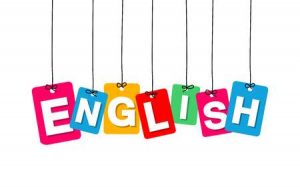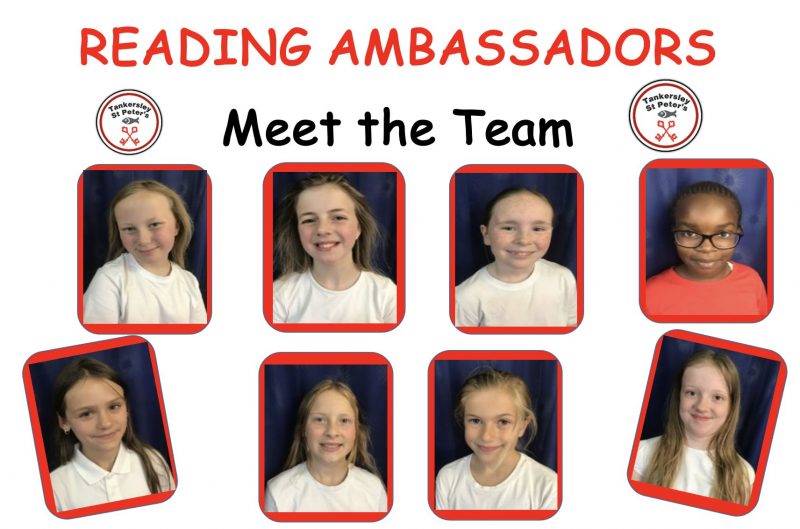Funnybones Past Tense
In our English lesson we played a game to help us spell verbs ending with the suffix -ed. We had...
Read More Our English lessons develop pupils’ spoken language, reading, writing, grammar and vocabulary. English is taught in a cross-curricular way, linking up with other areas of the curriculum. We teach our pupils to speak clearly, to convey their ideas fluently and confidently and to ask questions. Their vocabulary is developed systematically. Our pupils are encouraged to read for pleasure and to read widely. Just for the love of reading! Pupils learn to write in innovative ways and for a purpose and audience.
Our English lessons develop pupils’ spoken language, reading, writing, grammar and vocabulary. English is taught in a cross-curricular way, linking up with other areas of the curriculum. We teach our pupils to speak clearly, to convey their ideas fluently and confidently and to ask questions. Their vocabulary is developed systematically. Our pupils are encouraged to read for pleasure and to read widely. Just for the love of reading! Pupils learn to write in innovative ways and for a purpose and audience.
TANKERSLEY ONE PAGE COMPOSITION FORMING ARTICULATING IDEAS DOCUMENT EYFS -Y6
TANKERSLEY ONE PAGE COMPOSITION AUDIENCE & PURPOSE DOCUMENT EYFS -Y6
TANKERSLEY ONE PAGE COMPOSITION PLANNING DRAFTING EDITING DOCUMENT EYFS -Y6
TANKERSLEY ONE PAGE COMPOSITION VOCABULARY GRAMMAR & PUNCTUATION DOCUMENT EYFS -Y6
TANKERSLEY ONE PAGE TRANSCRIPTION HANDWRITING PROGRESSION DOCUMENT EYFS-Y6
TANKERSLEY ONE PAGE TRANSCRIPTION SPELLING PROGRESSION DOCUMENT EYFS -Y6
INFORMATION ABOUT READING FOR PARENTS & OTHER STAKEHOLDERS
2024-2026 ORACY POLICY AND PROGRESSION
2024-2026 READING POLICY AND PROGRESSION
Reading – Reading is a subject we value very highly at Tankersley St Peters. We are tenacious in ensuring every child can read by the time they enter KS2. As part of our commitment to teach every child to read, we provide parents of children starting in Reception with a pack of phonic cards. This enables parents to continue the work done in school and consolidate learning at home. We use the Read Write Inc phonics scheme and screen pupils every 6-8 weeks to ensure they are at the correct place in their phonetic knowledge acquisition. Phonic awareness helps the development of reading as pupils learn to segment and blend sounds.Phonetically decodable books are used daily and also taken home so pupils’ can practise sounds at home. The head teacher and reading leaders regularly screen pupils from an early age so no child slips through the net. All staff are seen as ‘reading leaders’ and attend coaching and mentoring sessions to support the teaching of phonics.
Reciprocal reading and comprehension sessions are taught through our Canine Pals. Pupils learn how to understand texts and answer a range of comprehension questions through the roles of each canine pal - Victor Vocabulary, Iggy Inference, Pip Predictor, Suki Sequencer, Rex Retriever and Sheba Summariser. In KS2, Arlo the Author and Cassie Commentator canine pals are introduced. Pupils become increasingly independent in these skills as their confidence in reading develops. A wide range of texts and reading materials are used - poetry, fiction and non-fiction texts. These comprehensions are also practised at home.
Parents are given clear expectations about reading at home. Each pupil has a home reading diary with key parts of our reading scheme inside it to support parents in helping their child. Workshops in reading are organised regularly in school to upskill parents in helping their child to be a reader.
See information for parents on our website.
Pupils are encouraged to read at home and home reading tokens are given out in daily group reading sessions to pupils who have read at home at least 3 times that week. A weekly reading raffle takes place in Sparkle and Shine assembly each week.
Reading areas in the classroom are inviting and lively with space for the Pupils to sit and read. Pupils visit their class and school libraries regularly to change their books. The Annual pupil council reading corner competition helps to promote lively reading spaces and to keep these fresh and exciting as well as in tune with what pupils enjoy reading.
Writing – We give our pupils many opportunities to write for different audiences and purposes and encourage pupils to see themselves as authors. To support pupils in moving towards independent writing we provide a wide range of writing stimuli including the use of quality ‘age appropriate’ texts as well as film and imagery. Emphasis is placed on all elements of spelling, punctuation and grammar as well as modelled, shared and guided writing, editing, handwriting and feedback to improve standards. We use drama techniques to encourage pupils to express their ideas and to develop sophisticated vocabulary. We provide opportunities for pupils’ writing to link to subjects in our creative curriculum to improve knowledge and understanding in context.
Extended writing is key to ensure our pupils have the opportunity to apply learned spelling, punctuation and grammar skills at least fortnightly. Highlighters are used to identify aspects of SPAG and for pupils to deepen their knowledge and understanding. Follow up from the extended writing sessions are built in after each extended writing session for pupils to up level their work – e.g. through mystery author /grammar detectives.
Writing is assessed using the Writing Standards (Y2 and Y6 use end of KS standards) to ascertain where the child is in their writing and to identify next steps for Pupils in each year group.
Spelling - Daily spellings lessons are carried out following the progressive Read Write Inc spellings scheme. Pupils have a weekly spelling test and take home their spelling log books to practice their spellings. Read Write Inc spelling is for pupils in Years 2 to 6 who can read accurately, with increasing speed. With 15 minutes of daily teaching, Pupils develop the ability to apply specific spelling rules to a variety of spellings. Although the teaching of phoneme-grapheme correspondence underpins this programme, it also develops pupils’ knowledge of word families, how prefixes and suffixes affect root words, and provides mnemonics to remember the trickiest spellings. The teaching revolves around instruction (with the help of online alien characters), partner and group practice, and competitive group challenges that help Pupils commit new words to memory.
Handwriting – We believe the teaching of handwriting is central to achieving high standards in all work and therefore handwriting is taught frequently throughout the week across KS1 and KS2 following the teaching of phonics and reading using the Read Write Inc. handwriting materials. Pupils are taught initial letter formation then relative size before moving on to ‘arm’ and ‘washing line’ joins and fluency within the scheme across KS1 and KS2.
Drama - Drama is used as a key tool in developing oral skills, vocabulary development, building confidence and self- esteem, and as an essential tool in developing imaginative, expressive, and persuasive spoken and written language. ‘Hot seating’, and other drama techniques are used in lessons to aid the development of speaking and listening, reading and writing skills. Imaginative role play is fundamental to developing the whole child, not just in Early Years and KS1 education, but also as the Pupils develop, and our curriculum provides opportunities to perform to wider audiences through assemblies and events around key festivals. There are many opportunities for our pupils to perform as they progress through the school and this is a strength of our curriculum.
Oracy – Spoken Language - In line with the English National Curriculum, we believe that speaking and listening is fundamental to children’s development, and that confidence in this area is essential to be successful in all areas of English. Knowledge of language underpins progression in spoken language, reading and writing.
Speaking and listening skills are directly taught, modelled and sensitively encouraged through whole class, small group and partner work. Opportunities across the whole curriculum are planned for and developed. Children play an active part in presentations, topic talks, debates drama activities and performances. Kagan structures and stem sentences are used to encourage discussion. The knowledge our children retain about topics is then articulated with children making worthwhile contributions. We use many strategies to encourage the children to remember to use new vocabulary in both their written and spoken language. Oral composition is used to practise grammatical conventions and different sentence structures. Dictation is a tool used to help our children practise spelling and handwriting. Each year group has identified oracy skills which outline explicitly what our children should know and be able to do to ensure they can ‘Say It before they Write It’.

In our English lesson we played a game to help us spell verbs ending with the suffix -ed. We had...
Read MoreToday we played a game to demonstrate our understanding of the spelling rules when adding the...
Read MoreIn the Year 4 classroom, we now have a cosy reading cottage that can be used as a quiet space for...
Read MoreThis week the children in class 2 have been drawing upon ideas in the text to think about special...
Read MoreThe Hungry Caterpillars took part in an indoor teddy bears’ picnic. The children followed...
Read MoreWe really enjoy deepening our understanding of a text by talking and asking and answering...
Read MoreThe Billionaires stepped into the magical world of Leon and the Place Between by turning our...
Read MoreToday in our English lesson we orally rehearsed our version of the poem ‘The Owl and...
Read MoreThe children have been creating Remembrance medals and exploring new and ambitious vocabulary such...
Read MoreThe Hungry Caterpillars have loved learning about the awesome season of autumn. The children have...
Read MoreToday we used adjectives to create noun phrases about a setting....
Read MoreIn our English lesson today, we began to infer and write in role. We wrote our hopes and dreams...
Read MoreIn groups we sorted the animals according to whether you add -s or -es for a plural....
Read MoreToday we identified the difference between questions, statements, commands and exclamations. ...
Read MoreWe have been identifying the difference between questions, statements, commands and exclamations....
Read MoreWe really enjoyed reading and analysing the poem called the Land of Blue. It made us think about...
Read MoreThe Class 1 children have written some wonderful animal poems. If you could be an animal, what...
Read MoreThe Shining Stars have been spotting clues at the Goldilocks crime scene, which they discovered...
Read MoreToday in our Geography lesson we tested our memories and oracy skills by taking part in a game...
Read MoreEach character had to use one of the 4 main types of sentence. ...
Read More